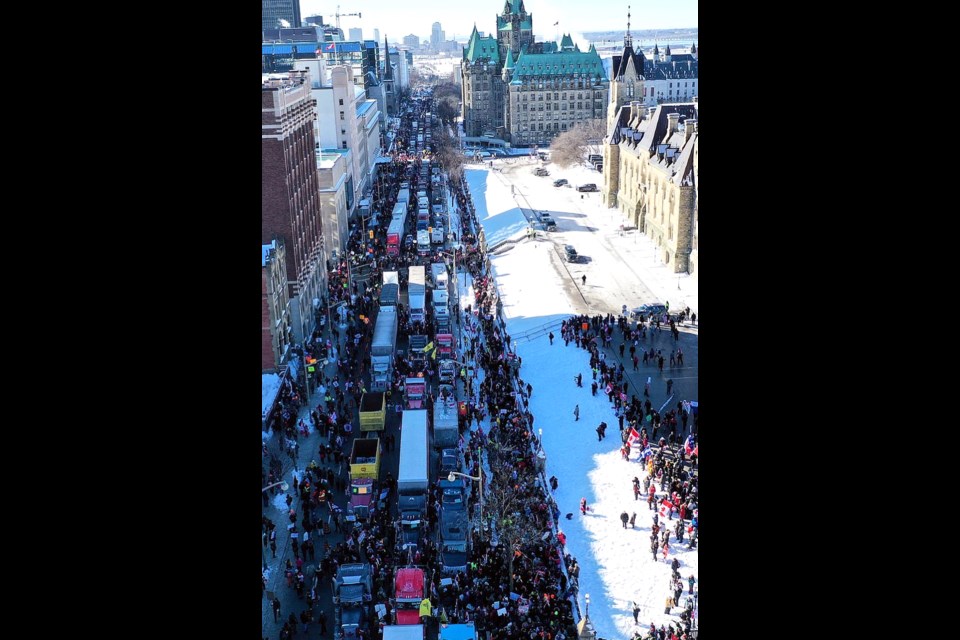OTTAWA – The Trudeau government didn’t discuss with Saskatchewan if the Emergencies Act should be invoked, said Saskatchewan government lawyer Mike Morris.
Morris was speaking during opening remarks by lawyers for the public inquiry into the federal government’s use of the EMA started in Ottawa Thursday. It is expected to wrap up on Nov. 25.
"Saskatchewan's position is that the federal government had already determined that a national emergency would be declared, before the First Ministers call on February 14,” Morris told the inquiry,
“The call was not so much about consulting as it was about telling.”
Morris added that the provincial government is concerned that residents’ rights may have been unnecessarily infringed.
On Feb. 14, to stop the trucker and freedom convoy protests, the Liberal government declared a public order emergency under the Emergencies Act. This was the first time in Canada’s history that the Emergency Act had been invoked. The Act states that government may only invoke it if they have reasonable grounds to believe that a national emergency exists and it can’t be dispersed through other legal measures.
Saskatchewan was always opposed to the federal government invoking the EMA. On Feb. 14, Premier Scott Moe took to Twitter and said that if the feds invoke the EMA it should only do so in the province that requests it.
“The illegal blockades must end but police already have sufficient tools to enforce the law and clear the blockades as they did over the weekend in Windsor,” said Moe. “Therefore Saskatchewan does not support the Trudeau government invoking the Emergencies Act.”
Unprecedented situation: Federal gov. lawyer
Robert MacKinnon, a lawyer for the federal government, told the inquiry that it was important for Canadians to understand the unprecedented critical situation the country was facing.
“The evidence will show that the invocation of the Emergencies Act was a reasonable and necessary decision given the escalating volatile and urgent circumstances across the country,” said MacKinnon.
Ottawa citizens 'still traumatized': Ottawa laywer
Lawyer Paul Champ, who represents the Ottawa Coalition of Residents and Businesses, told the inquiry that the convoy’s impact on their city was “three weeks of harassment, street blockages, ear-splitting air and train horns, and general lawlessness.”
He said many Ottawa residents felt like prisoners in their own home.
“The people in Ottawa are still traumatized.”
No justification to use Emergencies Act: Convoy lawyer
Lawyer Brendan Miller, who represents convoy organizers, said there was no justification to invoke the Emergencies Act. He said none of the criteria were met. It can be invoked due to espionage or sabotage, on the basis of clandestine or deceptive foreign influence, of threats or use of acts of serious violence against persons or property, or if a group or person is threatening to destroy or overthrow the government by violence.
He said the inquiry won’t hear any evidence of those threats.
No time to prepare: Ottawa Police lawyer
Lawyer David Migicovsky, who represents the Ottawa Police, said the Ottawa Police had little time to prepare for the protests.
“None of the intelligence predicted in the brief period of time prior to the convoy’s arrival was the level of community violence and social trauma that was inflicted upon the city and its residents.”
Dangerous precedent: Constitutional lawyer
Lawyer Sujit Choudhry from the Canadian Constitution Foundation, said invoking the Emergencies Act set a dangerous precedent.
“The act was used by this government against individuals protesting vaccine mandates but a future government of a different political stripe could use the act in response to protests against pipelines or climate change.”
Testimony from the 65 witnesses starts Friday.
Story corrected to say Emergencies Act
— Click for more from Crime, Cops and Court.



